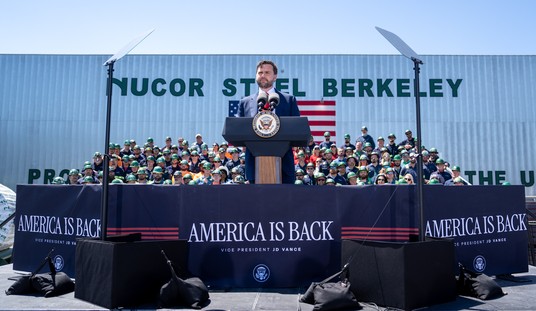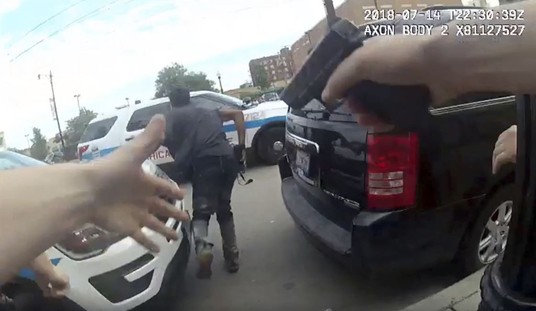For the past two years, Pope Francis has walked a tightrope over Vatican policy toward China. He made a deal two years ago with Beijing to compromise on episcopal appointments in China in order to ease the oppression on Catholics in the country. At that time, and ever since, the pontiff’s critics have accused him of going soft on China, both for abuses of the agreement and on human rights more generally.
Despite those criticisms, Pope Francis renewed the deal last month for another two years. The move angered the US, with Secretary of State Mike Pompeo warning that “the Vatican endangers its moral authority” in a renewed deal. A month later, however, Pope Francis has publicly called out the persecution of the Uighurs — and China has taken notice:
In a new book, Pope Francis for the first time calls China’s Muslim Uighurs a “persecuted” people, something human rights activists have been urging him to do for years. …
“I think often of persecuted peoples: the Rohingya, the poor Uighurs, the Yazidi,” he said in a section where he also talks about persecuted Christians in Islamic countries.
While the pope has spoken out before about the Rohingya who have fled Myanmar, and the killing of Yazidi by Islamic State in Iraq, it was the first time he mentioned the Uighurs.
Faith leaders, activist groups and governments have said crimes against humanity and genocide are taking place against Uighurs in China’s remote Xinjiang region, where more than 1 million people are held in camps.
As Francis Rocca and Chun Han Wong report for the Wall Street Journal, the timing of this release is curious. Not only did it take place just a month after the Vatican renewed its deal with China, it also came nearly simultaneous to its first exercise of the agreement. The ordination was meant to be an example of cooperative engagement with the famously self-idolizing Xi Jinping regime:
The Catholic Church in China ordained its first bishop since Beijing and the Vatican renewed an agreement on episcopal appointments last month. But Monday’s sign of better relations between Rome and Beijing was followed swiftly by friction over Pope Francis’s first criticism of China’s treatment of Uighur Muslims.
Bishop Thomas Chen Tianhao was ordained as bishop of Qingdao, in the eastern province of Shandong, according to the state-backed Global Times news portal, which said it was the first publicly reported ordination since the renewal of the pact. …
Bishop Fang Xingyao, chairman of the Chinese Catholic Patriotic Association and bishop of Linyi in Shandong province, presided over Monday’s ceremony, which was attended by 21 priests and more than 200 other members of the faithful, according to a state-backed website, Catholic Church in China. Bishop Chen was nominated as Qingdao bishop in November 2019, according to the report.
A senior Vatican official confirmed on Tuesday that Bishop Chen was one of several bishops selected and approved by Pope Francis before last month’s renewal of the agreement. The Vatican expects several of those bishops to be ordained in the coming months, the official said, expressing cautious optimism for the relationship.
That could be in jeopardy, as Beijing vociferously objected to the Holy Father’s characterization:
Foreign ministry spokesperson Zhao Lijian said Francis’ remarks had “no factual basis at all.”
“People of all ethnic groups enjoy the full rights of survival, development, and freedom of religious belief,” Zhao said at a daily briefing.
Zhao made no mention of the camps in which more than 1 million Uighurs and members of other Chinese Muslim minority groups have been held. The U.S. and other governments, along with human rights groups, say the prison-like facilities are intended to divide Muslims from their religious and cultural heritage, forcing them to declare loyalty to China’s ruling Communist Party and its leader, Xi Jinping.
Zhao, one of the Xi regime’s biggest propaganda mouthpieces, is never going to make mention of that. The curiosity is why the Vatican hasn’t been making more of a mention of it until now. The criticism from Pompeo wasn’t altogether altruistic — the Trump administration wanted diplomatic support for its trade/security battle with Beijing for its own purposes — but it wasn’t altogether wrong, either.
The impulse to make the deal was certainly understandable as a way to alleviate the very real suffering and persecution of Catholics in China. The Vatican bet that engagement would lead to greater liberalization, and in that they’re hardly alone. That was the bipartisan US policy toward before 2017 too, and likely will be again in 2021, as well as in Cuba, which the Vatican itself facilitated with the Obama administration. The problem with that is that it simply doesn’t work. The deals end up compromising the idealists who enter into them with tyrants and oppressors, rather than the regimes that create the oppression.
It appears that Pope Francis has belatedly realized this, and wants to test China to see whether it will renege over the real and valid criticisms of Xi’s concentration camps for Uighurs. Xi won’t pass this test, nor will he care, which will leave the Vatican with the same choice it had two years ago: cooperate with the regime or oppose it. And again, in that choice Pope Francis will hardly be alone either.









Join the conversation as a VIP Member